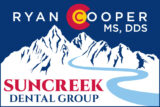
Our Services
Laser Dentistry in Littleton
In recent years, laser dentistry has superseded many traditional dentistry practices, making treatments more precise and less painful. This newer style of dentistry utilizes intense beams of light projected by a dental laser. Dental lasers can be used to perform a wide variety of treatments, including soft tissue shaping and removal.

The FDA deemed laser dentistry to be safe for public usage in 1990. Since then, many dentists have incorporated dental lasers into everyday procedures – reducing bleeding, anxiety and post-treatment recovery times. The beauty of dental lasers is that they damage far less of the surrounding tissue than traditional techniques – which means less discomfort and pain.
Benefits of Laser Dentistry
- Minimally Invasive: Laser dentistry is minimally invasive, as lasers can target specific areas of the mouth with precision. This means that there is less damage to surrounding tissues and less pain and discomfort for the patient.
- Reduced Bleeding: Laser dentistry is less likely to cause bleeding than traditional dental tools and techniques, as the laser cauterizes the blood vessels as it cuts.
- Faster Healing: Laser dentistry is less invasive than traditional dentistry. Because of this, patients typically experience faster healing times. Downtime is minimal.
- Reduced Risk of Infection: Laser dentistry reduces the risk of infection, as the laser sterilizes the area it is working on. This makes the procedure safer for patients.
- Increased Precision: Laser dentistry means laser focus. The laser allows for increased precision when performing procedures, making the procedure easier for both the patient and the dentist. Plus, there is less need for additional procedures.
- Reduced Need for Anesthesia: Having to undergo anesthesia can be scary for some people. Laser dentistry is less painful than traditional dental techniques, so there’s a lesser need for anesthesia.
- Versatility: Laser dentistry consists of soft tissue and hard tissue lasers that can be used for a wide range of dental procedures.
- Calmer Dentist Visit: No drills or loud tools are used. The laser makes the process quicker and easier, which means less time in the dentist’s chair and less anxiety, making for a better overall experience for the patient.
How Can Laser Dentistry Help Me?
Laser dentistry is incredibly versatile and plays an important role in a growing number of common dental procedures. Though laser dentistry is most notably associated with cosmetic treatments, it is equally effective for preventative purposes.
Here are some of the ways that dental lasers can be used:
- Tooth preparation – Prior to laser dentistry, a drill would be required to prepare the tooth for a filling. Lasers can now completely eliminate the need for drilling and anesthesia. Lasers also successfully kill oral bacteria around the surgical site.
- Reshaping soft tissue – Dental lasers can dissolve soft tissue to expose more of the natural tooth (crown lengthening), reshape soft tissue to make “gummy smiles” more attractive, and remove uncomfortable soft tissue folds caused by denture wear.
- Frenectomy – Lasers can improve speech and the feeding habits of babies, children, and adults by untying the tongue.
- Tumor removal – When benign tumors have formed in the soft tissue areas of the mouth, a dental laser can completely remove them without causing pain.
- Whitening – Lasers can greatly expedite the tooth whitening process by increasing the activity of the particles in the peroxide bleaching solution.
- Biopsy – Lasers are sometimes used to perform a biopsy on suspicious areas of soft tissue. This biopsy procedure can be performed instantly and with great precision.
Types of Lasers
There are different types of lasers, each of which interacts with the tissue in the mouth differently. For this reason, dentists must use a couple of different types of laser beams to perform a laser dentistry procedure. Laser beams operate at different wavelengths, and these wavelengths affect the gum tissue in different ways. The two main categories are soft tissue lasers and hard tissue lasers. By changing the wavelengths of light used, dentists can be very precise with treatment.
Soft Tissue Lasers
Soft tissue lasers are designed to be absorbed by hemoglobin (blood cells) and water. The gums are filled with blood, which contains a lot of hemoglobin molecules. This makes soft tissue laser beams the tool of choice for operations where the gums are involved rather than the teeth or bones. A nice side benefit of this type of laser is that when they cut through a blood vessel, they also seal it up right away to prevent bleeding or infection.
Hard Tissue Lasers
Hard tissue lasers are used when a dentist is working with the teeth rather than with the gums. These lasers are optimized to slice through bone or more specifically through the calcium phosphate that is the main ingredient in bones and teeth.
Regardless of which type of laser dentistry procedure you are thinking of having performed, you can expect less pain, reduced risk of infection, and faster recovery times from this advancement in dental procedure technology. Be sure to ask your dentist about laser dentistry options the next time you have an exam or cleaning.
How Are Laser Dental Procedures Performed?
Different types of dental lasers have been created to treat different conditions. Each laser uses a different wavelength of light, which predicates its best use. The most common types of dental lasers are carbon dioxide lasers and diode lasers, which are usually employed to treat soft tissue problems. The dentist will decide which type of laser is best to use after conducting X-rays and a thorough examination.
The laser beam is extremely bright, and special glasses will be provided to protect the eyes. The dentist will then direct the beam at the affected area and carefully dissolve the soft tissue, harden the filling, or whiten the teeth.
The procedure will take far less time than conventional methods, and cause far less anxiety and discomfort. The only real disadvantage of laser dentistry is that it can prove to be more expensive.
If you have questions or concerns about laser dentistry, feel free to contact our office to see if these procedures will be right for you.
